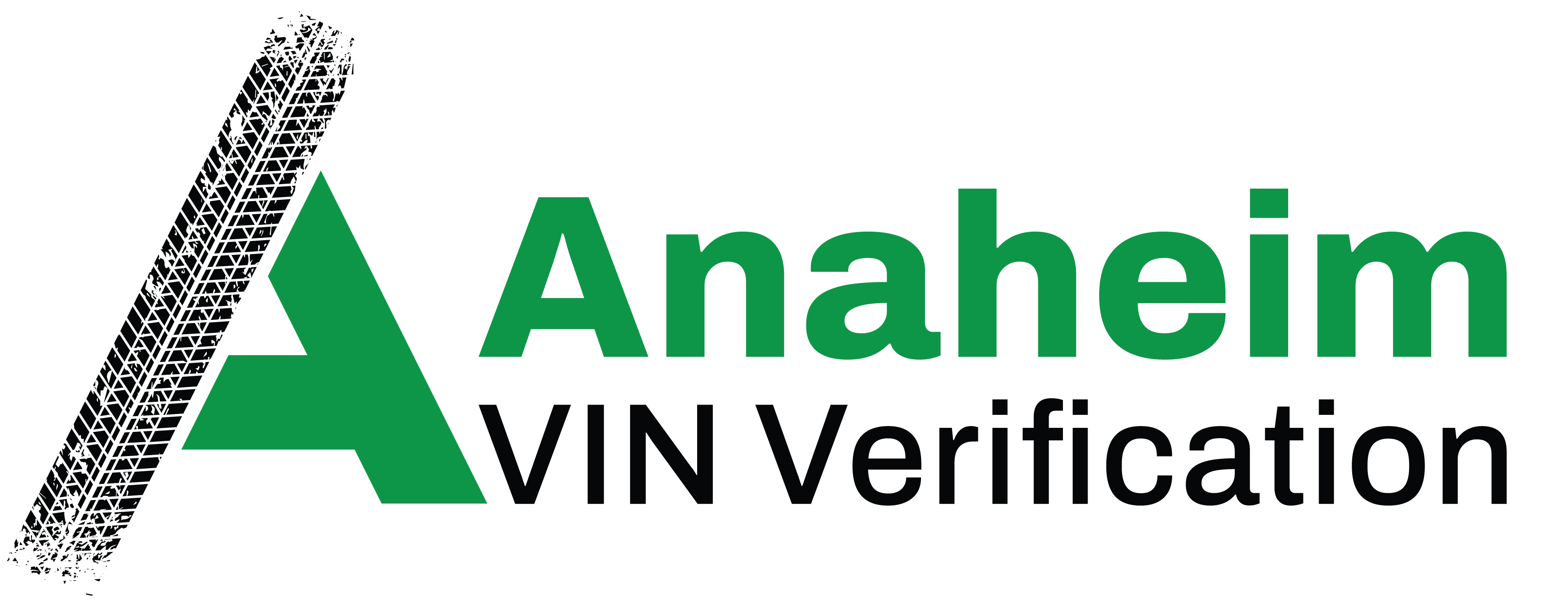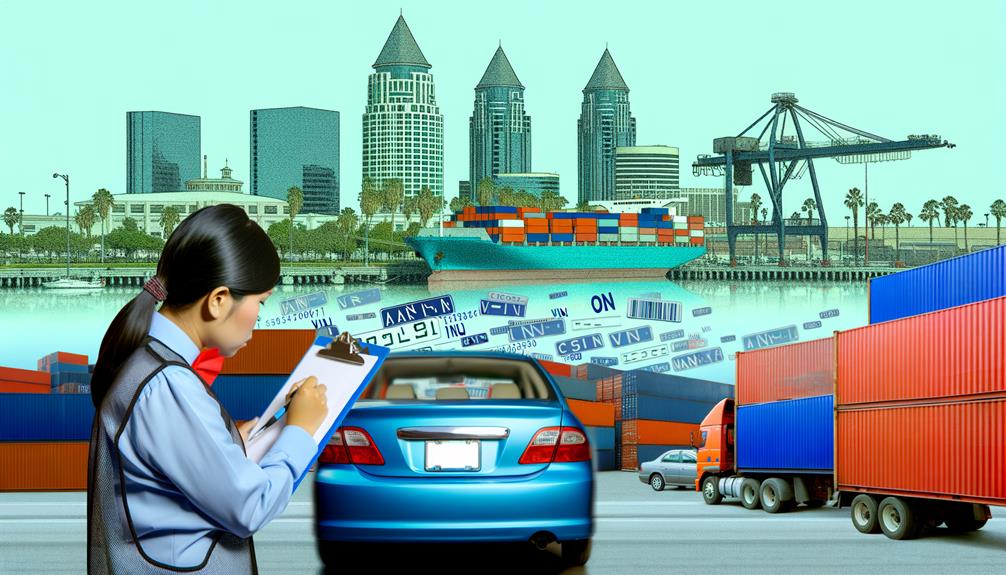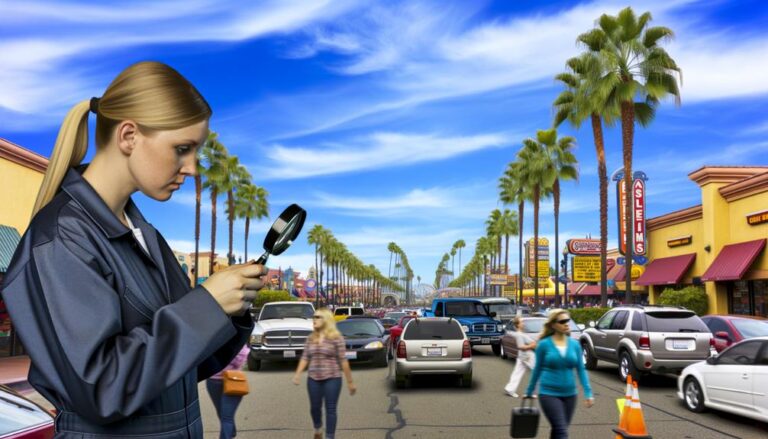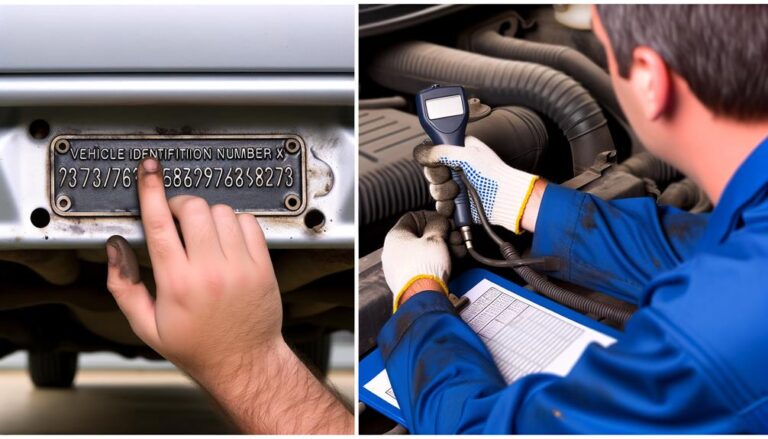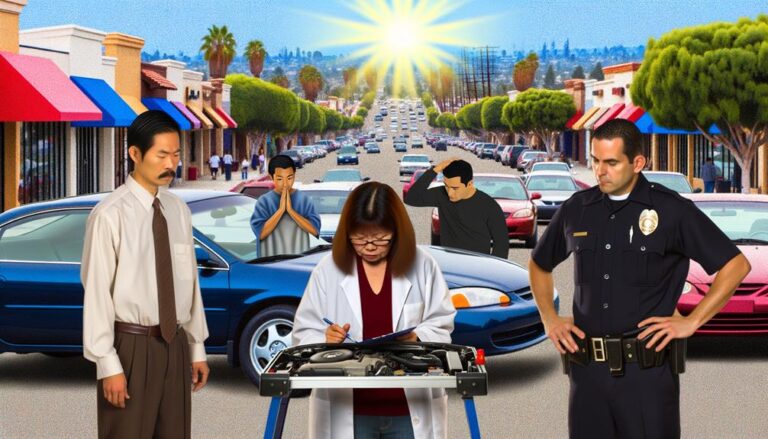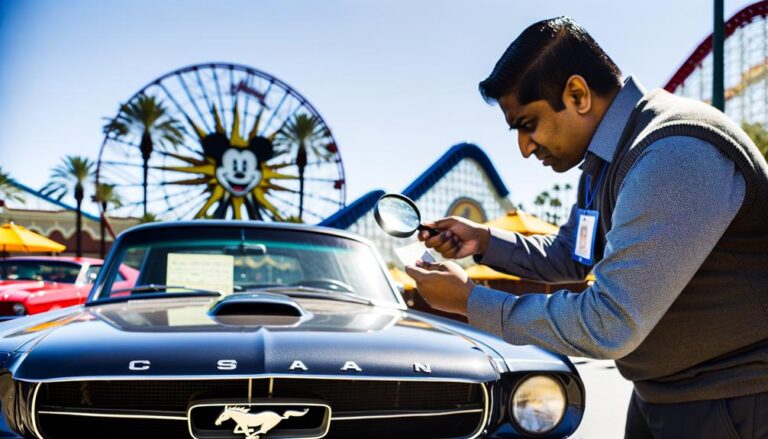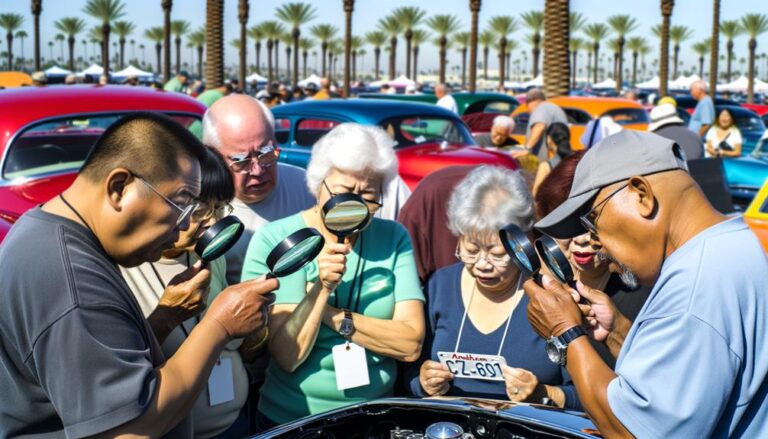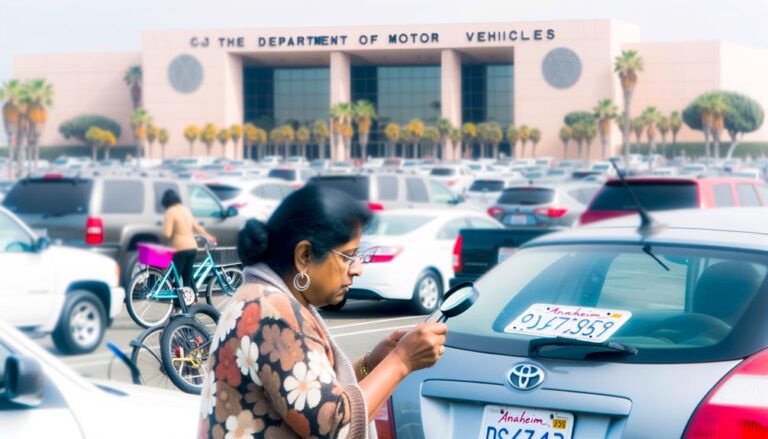Why VIN Verification Is Important for Importing Vehicles to Anaheim
When you're considering importing a vehicle to Anaheim, you might wonder why you need to go through VIN verification. It's not just a bureaucratic formality; this step is key to ensuring your vehicle meets California's strict environmental and safety standards. Without it, you're left vulnerable to legal issues, and potential fines—imagine finding out your newly imported car can't be registered due to non-compliance! Now, consider the deeper implications of skipping this crucial step, especially the impact on your vehicle's legality and your peace of mind. What other hidden challenges might you face in this process?
Overview of VIN Verification

VIN verification is a mandatory DMV inspection that ensures the identity and regulatory compliance of out-of-state vehicles before their registration in California. When you're importing your vehicle, this process is crucial to ensure everything's up to snuff. It's not just about following rules; it's about making sure your ride is set to roll without hitches on California roads.
During the verification, your vehicle's unique number, the VIN, is meticulously checked against the title and any supporting documents. This isn't just bureaucracy—it's a safeguard. It protects you from inadvertently buying or importing a stolen or illegally modified vehicle. Imagine the freedom of driving knowing your vehicle's past is legit and clear.
The DMV focuses on several key details during this process: the vehicle's year, make, model, and crucially, the odometer reading. They also verify the federal certification label to confirm your car meets specific safety and emission standards. Each of these steps ensures your vehicle isn't just another number in the system but a properly documented, legal entrant to the state.
Inspection Criteria and Limitations
To ensure your vehicle meets state requirements, the VIN verification process in Anaheim meticulously checks various criteria, including the vehicle's year, make, and model.
This thorough inspection of the vehicle identification number (VIN) is crucial for compliance with local regulations and for theft prevention. Each VIN's location on your vehicle is scrutinized to ensure it matches official records, safeguarding you from potential fraud issues.
The inspection criteria don't stop there; they extend to recording the number of wheels and axles, examining the license plate, and verifying the fuel type. This comprehensive check ensures your vehicle aligns with safety standards critical for your freedom on the road. Additionally, the odometer reading is assessed along with the status of the federal certification label, confirming that your vehicle adheres to necessary federal guidelines.
However, you'll face limitations if your vehicle is a revived salvage or deemed a junk vehicle. Such categories, along with motorcycles lacking necessary supporting documents, can't undergo VIN verification.
It's essential to have all your paperwork in order, including any specifics on past vehicle statuses, to ensure a smooth verification process. This diligence keeps your vehicle legitimate and ready for the roads of Anaheim.
Obtaining California VIN Verification

After understanding the inspection criteria and limitations, you'll need to complete the California VIN verification to register your out-of-state vehicle. This step ensures your ride meets the unique demands of California roads, keeping you free from legal hitches.
VIN verification is a crucial stage in the registration process. At its core, it involves documenting your vehicle's identification details like the VIN, make, model, and odometer reading. This information is cross-checked with your vehicle's title to prevent fraud and theft, safeguarding your ownership rights.
You've got several avenues to obtain this verification. You can head to a local DMV office, or if you prefer a bit more convenience, consider using mobile VIN verification services. These options let you tackle the process on your terms.
For those affiliated with AAA, you might find verification services right through your membership—talk about a perk! Alternatively, the California Highway Patrol (CHP) offices also conduct these inspections, ensuring your vehicle's compliance with state regulations.
Costs and Payment Methods
Understanding the various costs and payment options for VIN verification can help you manage your budget effectively. If you're importing a vehicle to Anaheim, knowing your financial options gives you the freedom to choose how you comply with the registration process.
At a basic level, VIN verification costs about $35 at a location like Quick VIN Verification. However, if you prefer the convenience of not leaving your place, mobile services range between $67 and $147, depending on your area.
You've also got cost-effective routes through the DMV and CHP, where VIN verification is offered at no cost, provided you have all the necessary paperwork. This is a boon for vehicle owners looking to save money.
When it comes to payment methods, there's plenty of flexibility. You can pay using cash, check, or modern digital payments via Zelle and Venmo. Credit and debit cards are also widely accepted. This variety ensures that you, as an importer, can handle transactions in the way that suits you best.
Each option offers its own balance of cost, convenience, and compliance, allowing you to navigate the registration process efficiently and within your budget.
Additional Anaheim Services
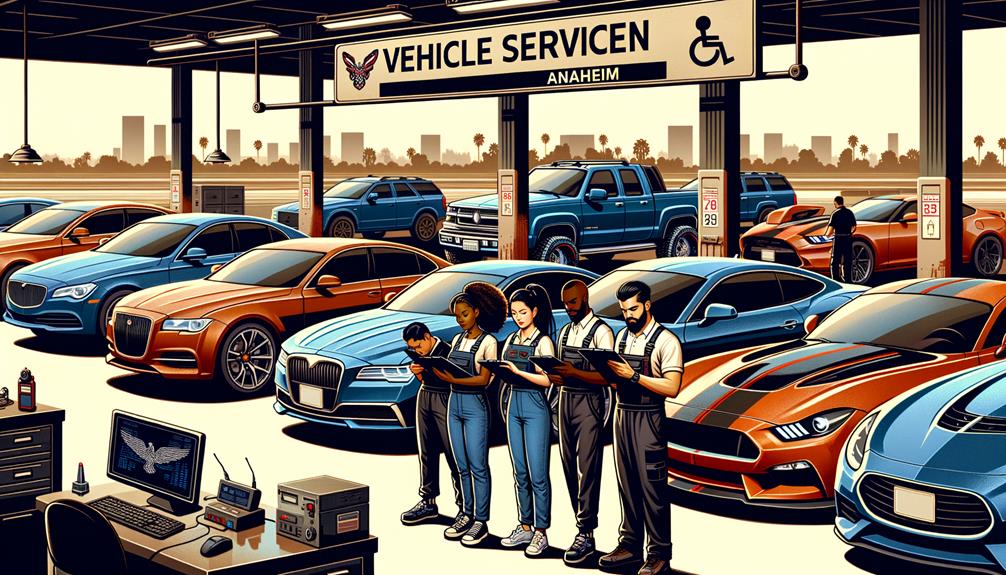
Quick Auto Tags in Anaheim offers more than just VIN verification; they provide a full suite of licensed registration services to meet all your vehicle transaction needs. As the most populous city in Orange County, Anaheim's bustling streets demand quick, reliable services that free you from the constraints of traditional DMV system delays.
At Quick Auto Tags, you'll find everything from initial vehicle registration for your newly imported vehicle to renewals and title transfers, all designed to keep you moving freely.
To cater to your busy lifestyle, they also offer mobile services, bringing essential DMV tasks right to your doorstep. Whether you're a local or here to enjoy attractions like Disneyland, you won't have to waste a minute more than necessary on paperwork.
Their array of payment options, including cash, check, Zelle, and Venmo, ensures that you can handle transactions in the way that suits you best.
Import Regulations and Requirements
Before you import a vehicle, ensure you're familiar with both the NHTSA and EPA regulations that affect models based on their age and mileage. Recognizing these rules lets you steer clear of legal hassles and ensures your vehicle sails through the import process.
If you're eyeing a classic, remember the NHTSA allows vehicles over 25 years old, and the EPA sets the bar at 21 years for emissions compliance.
Now, once you've picked out your ride, VIN verification becomes your next crucial step. This isn't just about matching numbers; it's about affirming your vehicle's identity and its readiness to meet California's stringent standards. You'll need the original title, detailed inspection forms, and clear display of both VIN and engine numbers.
Make sure your vehicle flaunts an EPA sticker if it's under 7,500 miles, proving compliance with California emissions.
For those bringing in models from 1968 or newer, brace yourself to meet California smog standards unless your treasure is from 1967 or older, which thankfully skips the smog check. Keep in mind, vehicles from 1975 and older must pass a Direct Import compliance inspection, ensuring they fit smoothly into California's landscape without a future smog test.
Smog and Testing Protocols

Navigating the smog and testing protocols requires knowing which vehicles need tests and which are exempt. If you're bringing in a vehicle to Anaheim and it's from 1976 or newer, you'll need to gear up for smog testing every two years to align with California emissions standards. This part of the VIN verification process ensures your ride meets the necessary environmental criteria.
For those of you with a passion for older models, vehicles crafted between 1968 and 1974 dodge the smog test but must still meet EPA requirements effective from late 1972. This is crucial during the importation process to ensure your classic car meets legal standards without the hassle of frequent tests.
And if you're a classic car enthusiast with a model from 1967 or earlier, you're in luck. Your prized possession is exempt from both smog testing and modifications, simplifying your journey through vehicle registration.
Direct import vehicles from 1975 or older have their own set of rules. They must comply with specific EPA guidelines right after importation but are spared from ongoing smog checks, offering a smoother transition into California vehicle registration and a sense of freedom in maintaining the car's authentic charm.
Registration Process Insights
To register your imported vehicle in Anaheim, you'll need to complete a VIN verification as a crucial first step. This isn't just a formality; it's your gateway to ensuring your vehicle's freedom on the road, aligning with local regulations and securing your peace of mind.
VIN verification is essential in confirming that your vehicle matches its title and supporting documents, crucial for theft prevention and fraud protection.
Once you've successfully verified the VIN, the next phase is the DMV registration. Remember, California insists on this inspection for all out-of-state and imported vehicles to ensure they're properly added to the DMV database. This step can't be skipped if you're looking forward to cruising down Anaheim's roads legally.
Moreover, the REG31/VIN verifier form will be indispensable. It's your proof of compliance with state regulations and confirms your vehicle meets specific emissions standards. Falling short here could stall your entire registration process.
To navigate these requirements smoothly, consider using licensed registration services. They specialize in handling these procedures and can significantly simplify your registration process, making sure your imported vehicle doesn't just meet the standards but exceeds them, ensuring you're set for a hassle-free drive.
Frequently Asked Questions
Why Do I Need a VIN Verification in California?
You need a VIN verification in California to ensure your vehicle's identity matches official records, avoiding registration issues and ensuring compliance with state safety and emissions standards. It's essential for a smooth registration process.
How Long Does CHP VIN Verification Take?
You'll find that a CHP VIN verification typically takes about 10 to 15 minutes. It's quick, ensuring you're not tied down, especially if you've got all your documents ready to go.
How Much Does a VIN Verification Cost in California?
You'll find that VIN verification costs vary in California. At a location, it's typically $35, but mobile services can run you $67 to $147. DMV and CHP offer it for free with appointments.
Why Is the Vehicle Identification Number VIN Important?
The VIN's crucial because it uniquely identifies your vehicle, ensuring you're not buying or driving a stolen or compromised car. It's your freedom to have a vehicle that's legally and safely yours.
